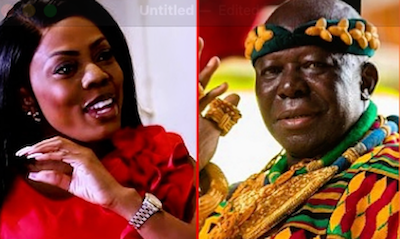Renowned Ghanaian journalist and media influencer Nana Aba Anamoah has ignited a nationwide conversation with her passionate endorsement of the Asante Kingdom’s cultural grandeur during a recent appearance on UTV’s United Showbiz program.
Nana Aba Anamoah on Asantehene Otumfuo Osei Tutu II & Asante Kingdom | Ghana Culture [VIDEO]
Speaking on September 20, 2025, Anamoah vividly praised the breathtaking splendor of the Ashanti region’s landscapes and traditions, while unequivocally naming Asantehene Otumfuo Osei Tutu II as the continent’s most influential traditional leader.
Her remarks, delivered with fervor in Twi, emphasized the unmatched prestige of the Ashanti monarchy, noting how its events draw diverse Ghanaians together in a display of national unity that transcends ethnic boundaries. This bold statement has quickly gone viral on social media, amassing thousands of shares and views as netizens celebrate her unapologetic pride in Ghana’s heritage.
Anamoah’s comments come at a poignant moment, following the recent funeral rites for the late Asantehemaa, Nana Konadu Yiadom III, which highlighted Otumfuo Osei Tutu II’s somber yet commanding presence amid the kingdom’s elaborate ceremonies. She highlighted how the Asantehene’s authority fosters a sense of collective identity, dismissing online critics who downplay his stature with a sharp rebuke: “Masa, sit down!” According to her, no other African monarch rivals the Ashanti king’s ability to unite people from all walks of life, a power she attributes to the kingdom’s deep-rooted traditions and the Asantehene’s 25-year reign marked by philanthropy and conflict resolution. Fans have flooded comment sections with applause, calling her words a refreshing affirmation of African royalty’s enduring relevance in modern Ghana.
Anamoah did not stop at praise; she turned her spotlight on a glaring oversight within the local media landscape, accusing Ghanaian outlets of neglecting to showcase the Asante Kingdom’s rich tapestry of history, art, and customs. In a pointed critique, she lamented how broadcasters and journalists often prioritize sensational stories over cultural deep dives, leaving the narrative of Africa’s oldest surviving empire to be potentially hijacked by foreign perspectives.
“We’re waiting for a white storyteller to come and tell our story,” she quipped, underscoring a broader frustration with the underrepresentation of indigenous voices in global media. This segment of her monologue has resonated deeply, prompting discussions on platforms like Twitter and Instagram about the need for more authentic, homegrown content that honors Ghana’s diverse ethnic legacies.
To drive her message home, Anamoah proposed a practical solution that could elevate Ghanaian storytelling on the international stage: partnering with streaming giants like Netflix for sponsored documentaries or series. “It doesn’t take money to pitch this—Netflix could turn it into an original production,” she asserted, envisioning high-quality visuals of the Asante Kingdom’s golden stools, festivals, and royal protocols captivating global audiences. Her idea taps into the success of similar projects, such as Netflix’s “African Queens” series, but with a twist—empowering local creators to lead. Industry insiders have echoed her sentiments, noting that such collaborations could not only boost tourism to Kumasi but also generate revenue and pride for the creative sector, all while countering stereotypes about African heritage.
As Anamoah’s viral clip continues to trend, it has sparked a wave of debates on cultural ownership, media responsibility, and the role of traditional institutions in contemporary society, with some calling for immediate action from media houses and others urging more voices to amplify similar narratives. Her intervention serves as a timely reminder of the Asante Kingdom’s pivotal place in Ghana’s identity, especially under Otumfuo Osei Tutu II’s visionary leadership. Ghana Trends Media will keep tracking these unfolding discussions and the potential for groundbreaking cultural projects. Share your thoughts in the comments—what steps should Ghanaian media take to reclaim our stories?



